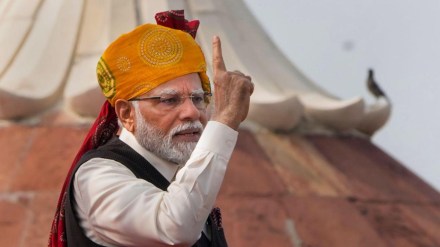Intro: If the promise of upholding the rule of law is true, why were there riots in Delhi, civil war in Manipur and communal violence in Nuh, Haryana? Why are bulldozers used to raze the dwellings and petty shops of the poor? If the assurance that the Constitution will be protected and preserved is true, why were laws made in Parliament to repeal Article 370, dismember the state of Jammu & Kashmir and alter the constitutional balance between the Lieutenant Governor and the elected government in Delhi?
On August 15, the Hon’ble Prime Minister spoke about the end of a 1,000 years of slavery and the start of a 1,000 years of glory. Apparently, the two millennia met at the very spot on which he was standing and at the very moment that he was speaking. If it were true, the speech would be as epoch-making as few events before — the enlightenment of Siddhartha, the birth of Jesus and the revelations to Prophet Muhammad. Or, in material terms, as epoch-making as the falling of the apple, the discovery of electricity, the invention of the telephone, the flight of the Wright Flyer, the splitting of the atom or the landing on the moon. I was sorry that I was not a witness.
I was, however, witness to a mundane, everyday event. Mr Rajdeep Sardesai, on his show on India Today, brought, face to face, two members of Parliament — Mr Jayant Sinha (BJP) and Mr Shashi Tharoor (Congress) — and asked them searching questions before an audience of knowledgeable and articulate college students.
The opening statements of the two guests about ‘India at 100’ aroused my curiosity. Mr Jayant Sinha wished for sustainable prosperity by 2047 and Mr Shashi Tharoor wished for an inclusive India by 2047. It raised a question in my mind: why can’t we have both? Listening to the two parliamentarians, claiming to reflect their respective party’s position, I was left with the agonising thought that, perhaps, India cannot have both.
Glaring contrast
In this column, I wish to explore Mr Sinha’s vow to protect and preserve the Constitution of India; his full-throated support of secularism, federalism and protection of human rights, and his promise to uphold the rule of law and enforce accountability. To the moderator’s direct questions, Mr Sinha answered, unequivocally, “Yes, you have the right to marry, you have the right to eat, and you have the right to religion.” Without batting an eyelid, he asserted that “within my party, we can express our differences. Absolutely. I have met with the senior leadership of my party and discussed matters of concern.” And to a question on what would be most important to him in 2047, Mr Sinha declared, “Freedom and Liberty”. I think Mr Sinha genuinely believes in what he said on the Rajdeep Sardesai-anchored show.
On the next day — our 77th Independence Day — the Hon’ble PM spoke for 90 minutes. I read the English translation of the speech. In sum, it was an ‘I, me and my’ speech, a medley of thoughts and a recital of what he believed had been accomplished in the last 9-10 years — until he spoke in the now-familiar coded language and railed against corruption, dynasty and appeasement. We know who his targets are. They are Opposition leaders, the Gandhi family and Muslims, respectively. At that point, the speech became a rehearsal for an election rally. Evidently, nothing has changed in the last 9-10 years.
Let’s return to Mr Sinha’s statements and juxtapose them with the speech of the Hon’ble PM. Mr Sinha was reassuring young college students that the centenary year 2047 would be a golden period. But the Hon’ble PM, while describing the new millennium, did not allude to any of the things that Mr Sinha promised — not the protection or preservation of the Constitution; not secularism or federalism or protection of human rights; not upholding the rule of law; and not enforcing accountability. There was not a word on any of the millennium assurances held out by Mr Sinha. Obviously, Mr Sinha and the Hon’ble PM were painting different pictures of the millennium that ‘started’ on August 15, 2023.
Inconvenient questions
Now, let’s place Mr Sinha’s statements alongside what is reported every day in the newspapers, television channels and social media. If the young college student has the right to marry any one of choice, why are inter-caste and inter-faith couples harassed, beaten or lynched? If the young college student has the right to eat any food, what was the controversy kicked up in Karnataka about ‘halal’ and ‘non-halal’ meat? If the young college student has the right to practice any religion, what is the role of the Bajrang Dal, the Hindu Mahapanchayats and the right-wing outfits and why are there hate speeches against Muslims and Christians? Above all, why is there so much violence around us?
If the promise of upholding the rule of law is true, why were there riots in Delhi, civil war in Manipur and communal violence in Nuh, Haryana? Why are bulldozers used to raze the dwellings and petty shops of the poor? If the assurance that the Constitution will be protected and preserved is true, why were laws made in Parliament to repeal Article 370, dismember the state of Jammu & Kashmir and alter the constitutional balance between the Lieutenant Governor and the elected government in Delhi?
These are inconvenient questions but, I am sure, the gathering of college students wanted answers to these questions. The two questions they were allowed to ask were probing and provocative but elicited unsatisfactory answers in an otherwise splendid show.
Sidelined hope
I believe Mr Sinha and a few others in the BJP are secular, liberal and wish to uphold the present Constitution. Unfortunately, the leadership of their party had sidelined them long ago. The grandiloquent declaration of the start of a new millennium arouses not hope but fear.
